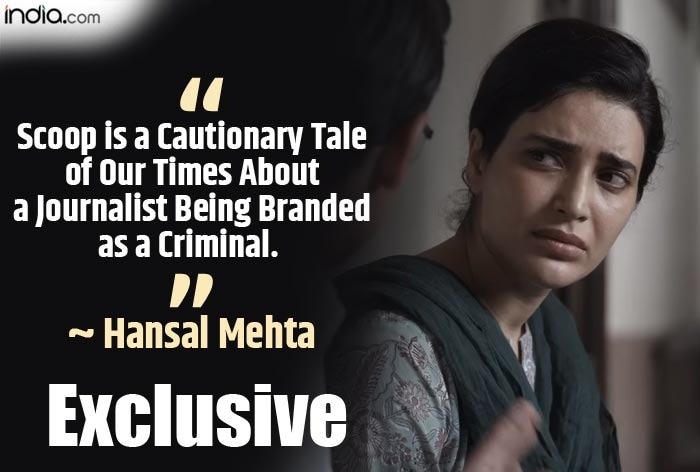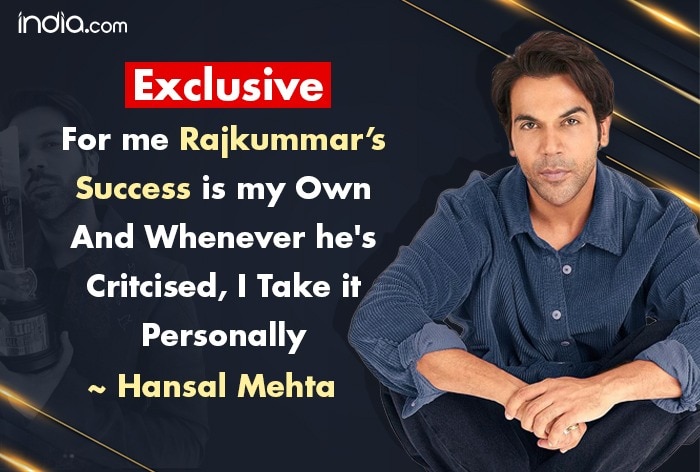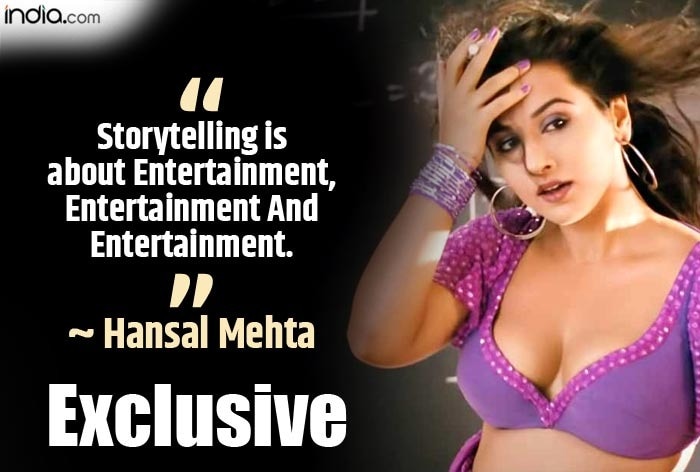Hansal Mehta speaks about his latest series ‘Scoop’, role of media as the fourth pillar of democracy and more, in an exclusive interaction with India.com.
Hansal Mehta on Scoop, Storytelling And More | Exclusive: Hansal Mehta is among the filmmakers who like to explore diverse narratives and genres with every new story. He is known for making unconventional choices ever since the primary stage of his career with the television shows – Khana Khazana and Star Bestsellers. Mehta, who recently won accolades for his biographical thriller Faraaz is once again back-in-action with his new series Scoop. The Karishma Tanna starrer is an on-screen adaptation of journalist Jigna Vora’s book. In an interaction with India.com, the national-award winning director speaks about storytelling, journalism and his equation with Rajkummar Rao over the years. Excerpts from the interview.
HANSAL MEHTA SAYS ‘SCOOP IS A CAUTIONARY TALE OF OUR TIMES’
Scoop is based on journalist Jigna Vora’s book Behind Bars in Byculla: My Days in Prison. On being quizzed what was the most intriguing factor from Jigna’s life that made him realise this story needed to be told, the filmmaker says, “I thought there is a chance to tell a larger story about our times. Through Jigna’s character there was an opportunity to explore this theme of the reporter being reported. It is a cautionary tale of our times by dramatizing what is in the book and beyond the book.”
HANSAL MEHTA FEELS THERE IS A NEED TO REFLECT UPON THE FOURTH PILLAR OF DEMOCRACY

The web show is set in the backdrop of 2011 and a lot has changes in media, politics and cinema since then. When asked, how relevant is the story of Jagruti Pathak in the present times, Mehta opines “When I say it’s a cautionary tale, this is 2011 where an ambitious journalist who goes out there reporting on some of the most significant crimes of that time. How she becomes branded as a criminal. It’s that cautionary tale because today it is getting even more worse. The media has made itself more vulnerable because it has started taking sides. So, I think the story becomes more relevant even today. Because the unwritten alliance between the fourth pillar and all the other pillars of society is something that we need to think about, reflect and document it.”
HANSAL MEHTA SAYS ‘THERE IS NO AGENDA BEHIND MY STORYTELLING’
There is a row over Adah Sharma starrer The Kerala Story as the film has been labelled propaganda ever since its release. The Scoop director has experimented with sensitive themes in Shahid, Aligarh and Omerta. On being questioned, how does he stay true to the authenticity without hurting sentiments or refrain from getting provocative in his storytelling, he states that “I do my work very simply. I don’t judge my characters and their circumstances. There is no agenda behind my storytelling. The only reason I tell stories is to allow the audience to be the judge, reflect and to question. In my opinion it is my job to raise those questions for the audience. In my work, the audience is an equal collaborator as much as the writers, actors, and everyone else. Because the audiences have to go back, take the story, think and make their own judgments about it.” The filmmaker is not just known for choosing hard-hitting themes, but also his unconventional choice of casting. When asked what he sees in an actor while deciding to go ahead in them, especially in films and series dealing with serious subjects. Mehta tells, “I think the focus must be on the character. The person whom you are casting, you should see your character in them. That’s all I look for when I am casting. And I am off course helped by Mukesh Chabra who always pushes me to experiment and try new things. Then off course I can cast with such honesty, thanks to the producers and the platforms that have supported my work. And I am hoping that this continues.”
HANSAL MEHTA OPENS UP ON HIS EQUATION WITH RAJKUMMAR RAO

When mentioned how Rajkummar Rao has had his career defining films with Shahid, Aligarh, Omerta, the Scoop director disagrees. He points out that “I feel Badhaai Do, Bareily Ki Barfi and Stree were also career defining for him in different ways. If Shahid catapulted him to the level of fantastic actor, Bareily Ki Barfi pushed him towards getting more universal recognition and audiences. A good actor can also be commercially acceptable. Stree made him into a saleable actor. I think for me Rajkummar’s journey, the choices he makes, all his successes I consider as my own successes. Whenever there is a failure or he is criticised, I take it personally.” Mehta also shares about his rapport with the Bheed actor. He further adds “Raj (Rajkummar Rao) came into my life when I was not making movies. So, in a way he came in as a child who is born in your house who brings luck to you. For me it’s beyond just work. When we shoot, there is an unwritten communication. We just shot recently for few days. I told Raj we were shooting after five years. Chhalaang was the last film we did. But it never felt it was after five years. I don’t have to tell him what to do on the set. We talk about the scene; he goes and that’s it. It’s a rare thing but that’s the equation I share with Raj.”
HANSAL MEHTA SHARES HIS EXPERIENCE WHILE RESERACHING FOR SCOOP
Scoop is an on-screen depiction of real-life events. When asked what impact it had on the filmmaker at a human level while researching on it, he replies, “I believe every story changes and shifts something within you and that has happened with Scoop as well. It increases your understanding of the world. When you get into the story about journalism, you are increasing your understanding of their world, life, and aspirations. Also, when I look at other characters in the series like Harman’s role, I’m understanding his point of view of how much is he cornered. What is his compulsion in this entire case. So, while doing that your respect and pure empathy towards people in general increases whom you would rather disregard. That is what stories ultimately do to you. All the other materialistic things like buying a new car or getting more money are part of your profession. The ups and downs determine your financial prosperity. But what shifts within you is how much you have grown as a human being with each story that you tell and that happens to me. It’s also because of people you work with. You borrow so much from them. Like Karishma is an unpretentious person. So, working with her is like she is one of us. That sort of just increases your connection and engagement with humankind in general.”
HANSAL MEHTA SAYS IT IS IMPORTANT TO KEEP THE AUDIENCES ENGAGED

On being quizzed what message the team of Scoop has for the audiences who are looking forward to the series, Mehta concludes by saying that “Firstly, there is no message. It’s a story and the message is what you draw out of it. I don’t tell stories for message. I throw you into a world and I tell you, find your message and judgment. For me it is important how much a show keeps you engaged. How much are you involved in Jagruti Pathak’s journey and how much are you enjoying the show. Ultimately, believe it or not, what Vidya Balan said in Dirty Picture, it’s ‘Entertainment, entertainment, entertainment.’ That must happen. If that happens and I know how to tell a larger story about the world, then I have achieved. I can have the greatest message in the world, but if I am not engaging with you, then it’s pointless.”

